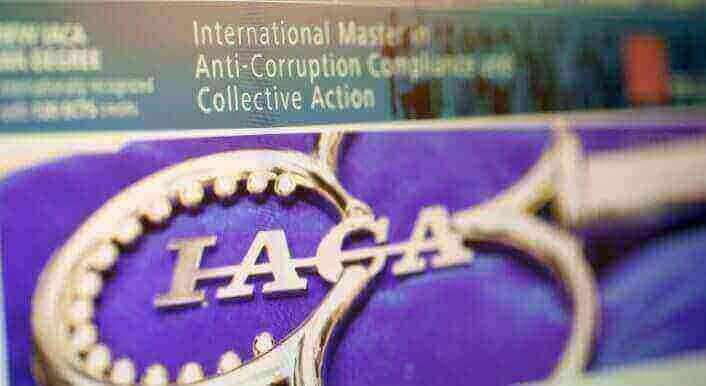Hide and seek
Transparency International claims to lead the global fight against corruption. But there are gaping holes in the financial accounts of its own multi-million euro anti-corruption conference. In 2012, the event was held in Brazil and partly funded by German taxpayer money. Yet there is no comprehensive account for the event. Some corporate sponsoring was kept off-the-books altogether.

Transparency International, the world’s leading anti-corruption organisation, is proud of its reputation. The organisation makes headlines when it denounces a country or a company for being corrupt. Just last month, it sent out another statement on football federation Fifa, calling for President Sepp Blatter to step down.
But Transparency does not seem to apply the rules against which it measures others to itself. At least not to the financing of the International Anti-Corruption Conference (IACC). This conference, held every two years in a different country, brings together the world’s leading anti-corruption activists. It provides them with a forum to network and discuss strategies for preventing bribery. The basic principle is simple: all decisions need to be above board. Financial accounts need to be presented in a transparent and properly documented manner.
But this is not precisely the case with Transparency’s most important conference.
One conference, two budgets
In November 2012, the IACC conference was held in the Brazilian capital Brasilia. Nearly two thousand participants from 140 countries took part. It cost over 3 million euros. The Brazilian Comptroller General provided the biggest part of the funding, paying 2.5 million euros. Other income came from participants fees, corporate sponsors and funding from the German government and the United Nations Development Program.
But even though the conference costs millions of euro, Transparency International is unable to present comprehensive conference accounts. The organisation argues that the financial flow is spread over two different budgets: one for the local costs of organising the conference and one for the costs incurred at its global headquarters in Berlin, where TI staff design the conference program.
But there was a third income stream, which does not appear on the books altogether. Both TI and Amarribo, the local TI representative in Brazil which helped to organize the conference on the ground, say that corporate sponsors paid money directly to an event company contracted by Amarribo, including for the conference’s social events. TI says that Petrobras, Brazil’s state-owned oil company as well as three banks paid a total of 155,000 euros to have their logos placed on the conference’s main stage. These funds were not included by either Transparency or by Amarribo in their conference accounts.
Deep inside the footnotes
CORRECTIV in partnership with German business daily Handelsblatt has pieced together the IACC’s financial flows based on publicly available accounts and contracts, information provided by TI and Amarribo as well as government records obtained under Germany’s freedom of information law. The case is inevitably complex and full of details — as is invariably the case when transparent accounting is lacking.
According to TI, the IACC in Brazil generated 291,000 euros in participants fees, which was split between the organisation and its local partner Amarribo, with TI receiving 219,000 euros. But in its 2012 financial report, TI did not include this income in the IACC account presented in the appendix. Instead, it accounted for this revenue as „other income“ in its overall income statement. Even deep inside the footnotes to the overall income statement there is no reference to the IACC. This means that outsiders are unable to retrace the source of these funds.
A deep shadow
This highly questionable form of accounting casts a deep shadow over funding the conference received from the German government’s development aid agency GIZ. The funding contract only lists two donors for the conference, the Brazilian government — through the country’s comptroller general — as well as GIZ. The Brazilian government was to pay 2.63 million euros and the German government 300,000 euros. There is a reference to further potential donors, but no mention of specific amounts. And there is no reference at all to corporate donors or participant fees.
According to German government funding rules, only those events are eligible for funding that would not take place if it were not for government funding, or at least not in a satisfactory manner. This is why funding recipients are required to report additional funding to the government donor under the contract’s clauses. The clause is designed to prevent recipients of government funding making a profit at the taxpayer’s expense.
The German government funding for the IACC in Brazil was earmarked for a number of workshops held within the framework of the IACC. But in Transparency’s report on its project expenditures submitted to GIZ after the event there is no reference to other income sources related to the event.
Lack of transparency
Transparency admits that its financial reporting on the conference lacks transparency. This is due to the budget being split into the local component as well as its own reporting, the organisation says. But Transparency rejects the accusation that the organisation failed to report the conference’s additional income sources to GIZ to enable the donor to re-assess its funding for the conference workshops. Roberto Perez Rocha, the director of Transparency’s IACC program at the organisation’s Berlin headquarters, told CORRECTIV that as GIZ only funded one specific part of the conference that there had been no need to report the overall conference’s additional income. He says that Transparency informed GIZ by publishing the organisation’s financial reports. The organisation also maintains that the report complies with international accounting standards.
Transparency also insists that it has made no profit from the IACC held in Brazil. The participant fees accounted for in the general income were used to cover „indirect costs“ associated with the conference, says Miklos Marschall, the organisation’s deputy managing director. He did not further elaborate on these costs that so far have not been accounted for under the IACC accounts. Transparency promised to disclosed these costs, but so far has not done so.
No answers from GIZ
GIZ says it will let the matter rest. In a statement, the agency argues that Transparency was only obliged to report any additional funds for the workshops, not for the overall event. GIZ also says that according to Transparency the conference’s costs were higher than initially planned. There is, however, no trace of this in the documents reviewed by CORRECTIV. GIZ does not say when and in what form Transparency reported these additional conference costs.
The reference to higher conference costs also contradicts GIZ’s own argument of only taking the workshops into consideration. And when GIZ does look beyond the workshops to the entire conference it does so only on the cost side, not on the income side.
Funding experts asked by CORRECTIV said that purely based on the funding contract between GIZ and Transparency, GIZ has in fact no right to claim any money back from Transparency.
The contract was signed only a few weeks prior to the conference. Funds had suddenly become available in the government’s funding budget. GIZ was looking for somebody to spend the money, a person familiar with the matter at TI said. Bottom line: when GIZ is funding parts of an event it does not matter if the entire event yields a surplus. This can hardly be squared with Germany’s general funding principles.
Laundering reputations?
Transparency has quadrupled its annual donor income over the past ten years. It now stands at 26.7 million euros. The organisation is seeking funding from corporations such as the Italian oil company Eni or accountants PriceWaterhouseCoopers. Critics say that some corporate donors are using the organisation to improve tarnished reputations.
The same seems to apply for countries. For a few million euros, governments can acquire hosting rights for the IACC conference. The most recent event was held in Malaysia this month, whose prime minister is accused of embezzling hundreds of millions of dollars in public funds. Initially, Najib Razak was scheduled to speak at the conference. He would not have been the first controversial politician to appear at the conference. At the 2012 Brazil event, President Dilma Rousseff delivered the inaugural speech to the delegates. Rousseff chaired the supervisory board of state-owned Petrobras for seven years during the time when company officials and members of her political party were involved in a multi-billion bribery scheme.
In this regard, the IACC principle calls Fifa to mind: whoever pays millions for the global anti-corruption festival, gets to host the conference. Transparency argues that there is no black and white in the fight against corruption. „We’re trying to promote dialogue, sometimes with the necessary amount of criticism as well“, says Perez Rocha on the IACC funding by governments with a poor anti-corruption track record.
CORRECTIV and Handelsblatt have done extensive research on the accounts of only one of the IACC conferences. There is even less transparency on other. For the event held in Thailand in 2010, Transparency presented a Thai-language document as the conference audit. The document, however, contains only one budget line on an unspecified conference (marked with an asterisk).
The IACC’s next host will be Panama, still an important off-shore tax haven. But for the time being, Transparency will need to be busy with its own books.
We are publishing documents relevant to the investigation here. The linked documents contain our explanation of the most significant points.
Contract between Transparency International and the GIZ on funding the IACC in Brazil
The funding rules of Germany’s federal government
Auxiliary clauses to the government funding rules
Transparency International’s 2012 financial report
Transparency International’s 2013 financial report
The IACC account of Amarribo, Transparency’s local partner in organising the conference
Transparency’s expenditures report to GIZ after the IACC conference
Disclaimer: CORRECTIV executive director Christian Humborg worked as executive director of the German chapter of Transparency International until fall 2014. Anne Koch, member of the CORRECTIV ethics council has been regional director for Europe and Central Asia at Transparency International since 2011. Neither Christian Humborg nor Anne Koch had anything to do with this story.

